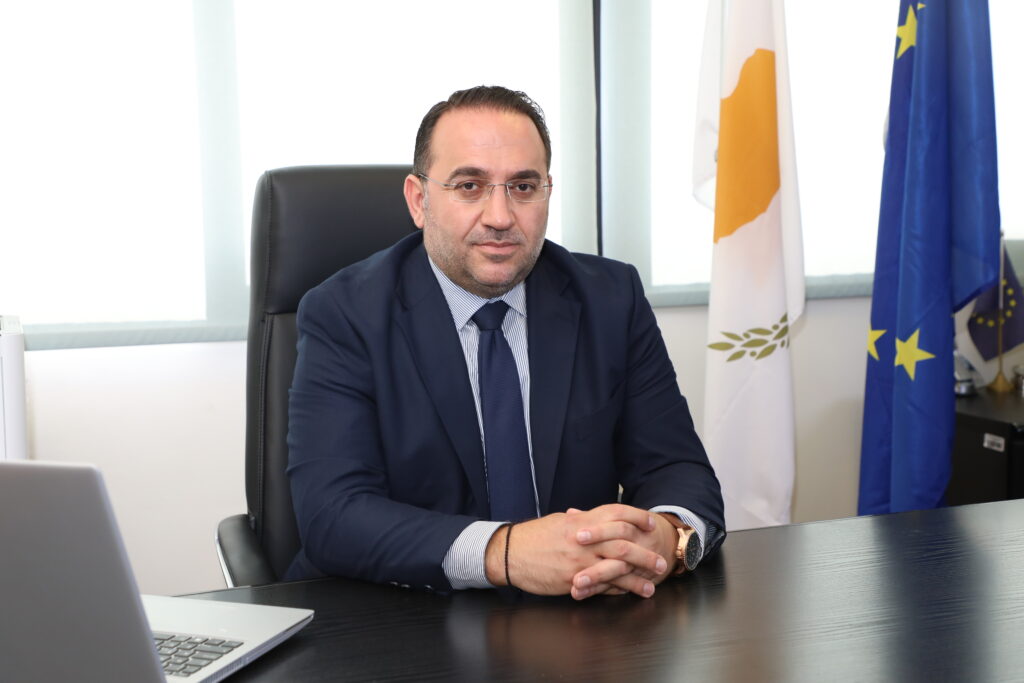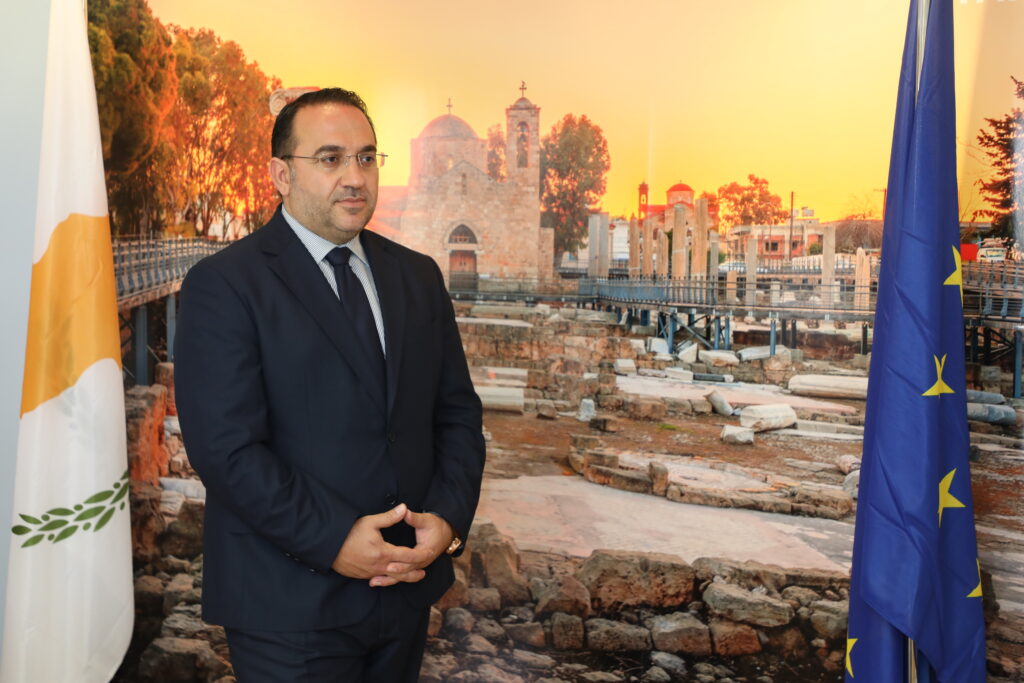Filenews 13 June 2023 - by Evagoras Prokopiou
The Deputy Minister of Tourism, Kostas Koumis, talks to Insider about the update of the National Strategy for tourism for 2035, so that it takes into account the course of tourism globally, the new market trends as they have been shaped in the post-covid era and sustainable development. He points out that innovation and technology have been put at the service of tourism using ORM , while as he says, the creation of the tourism observatory is imminent. The Deputy Minister referred to the actions and plans that are being or will be made so that our industry can overcome any problems that may arise.
What in your view are the main challenges that tourism will face this year and in the coming years? What measures can be taken to address them?
The multifaceted nature of the tourism sector makes it susceptible to various endogenous and exogenous factors. This clearly also applies to tourism in our country. Therefore, we should constantly work with the aim of increasing the quality of the services offered, enhancing the tourist experience but generally towards increasing the competitiveness of our country as a tourist destination. That in itself is a big challenge. It is extremely important that we improve even more in terms of infrastructure. If we divide infrastructure into private and public, we immediately come to some conclusions.
The main core of private infrastructure is accommodation infrastructure, that is, tourist accommodation. It is commonly accepted that we have improved greatly in recent years, in the sense that the vast majority of our country's tourist units have been renovated. If we take into account the fact that we also have some new arrivals of admittedly very special accommodation, we conclude that we are competitive in terms of private infrastructure. To this we can also add the various other private initiatives and investments that enhance the tourist experience, such as theme parks, recreation areas and intangible infrastructures that are also being improved, with the main exponent I would say the gastronomy of our country.
Now, in terms of public infrastructure, I would say that progress has also been made in recent years, but we can improve even more. We still identify gaps, or infrastructures that need serious upgrading in already established tourist areas. At the same time, there is a need to create basic infrastructure in areas with tourist prospects, which is also a great challenge. This essentially falls under what is called spatial expansion, which is something that is recommended and should be done as it avoids any phenomena of overtourism that we already see happening in other countries. Of course, it is good to remember that public funds are not inexhaustible.
Continuing from this, the challenge is not only the spatial expansion of tourism to other areas, but also the extension of the tourist season, with the ultimate goal of mitigating seasonality and developing winter tourism. Look, the challenges facing tourism in our country are many. The challenge is the need for continuous improvement of our country's air connection, which in light of the new data, Fit for 55, is turning into a more demanding effort.
The challenge is for all those involved in the tourism industry to understand the need to move all together towards a model of sustainable tourism development, before I would say "punished" by visitors. It is important for everyone to realize that the percentage of European citizens who give priority to eco-friendly destinations is increasing exponentially every day. On this occasion, I would like to mention that as a Deputy Ministry we plan to organize a relevant conference next autumn.


Of course, the challenges are many, as I said, and they continue.
The challenge for decades has been to extend the tourist season and transform our country into a year-round destination, the challenge is to penetrate new geographical markets, the challenge is to strengthen special forms of tourism, at least those that present elements that can act as comparative advantages, the challenge is to manage the issues concerning our coasts, our beaches, as Cyprus has been established and is an extremely good tourist destination for sun and sea, the challenge is to improve the hinterland, to increase competitiveness in mountainous areas and much more.
On your initiative, an effort has been launched to absorb Ukrainian refugees into the tourism industry with the aim of helping them and hoteliers who constantly complain about staff shortages. What can the Deputy Ministry do to address this problem?
The responsibility of the Deputy Ministry of Tourism in relation to Ukrainian refugees is to conclude contracts with tourist units of our country for the purpose of hosting them. We have no responsibility in relation to the management of issues concerning Ukrainian refugees in general. However, yes, we have taken an initiative in order to help both the tourism industry of our country, which is characterized by a lack of human resources, and the Ukrainian refugees who wish to integrate into the labour market.
Although employers have shown great willingness and some of them have shown readiness to offer a very insignificant subsistence allowance in addition to salary, I would not say that we have had the expected results. This, of course, is due to a number of other facts that are not related to tourism.
TOURISM STRATEGY
When you took office, you highlighted the need for a new strategy for tourism. Are there any omissions in the existing strategy and do you think you should make additions or changes?
The previous government rightly proceeded with the elaboration of a comprehensive National Tourism Strategy (EST) for the period 2020-2030, which was approved by the Council of Ministers and its implementation is in full swing. The Strategy was partially updated at the end of 2022, at the end of the short-term action plan contained therein. A key priority for us is the update of the National Tourism Strategy with a time horizon of 2035, taking into account of course the course of tourism globally, the new market trends as they have been shaped in the post-Covid era, the necessary in all respects path towards sustainable development and much more. It is not a matter of omissions, the need arises from the fact that new trends have emerged in the post-covid era, with the most important being the fact that it is imperative to move faster to a model of sustainable tourism development.
Several players in the tourism industry see 2023 approaching the arrivals of 2019. What are your own assessments and where are they based?
Personally, I have never made such a reference. On the contrary, I had and still have a number of concerns. We have simply announced our target, which is an increase of 5-10% compared to last year, with a footnote that we will never stop working for even better results.
Over the past few years, there has been a significant increase in the country's connectivity. Do you think this trend will continue?
It's not a matter of trend. It is a matter of intensive and collective effort that must never stop. We are an island destination, which means that we need a good air connection and not only during the summer months, but all year round. This effort will become more difficult in the coming years due to the implementation of the fit for 55 policy. Personally, what I have to say is that we are in constant communication with the airlines to further improve the air connection of our country.
In recent years we have seen Cyprus make a strong footing in the cruise sector, will the Deputy Ministry take steps to maintain this trend?
Cruise tourism is a special form of tourism with excellent growth prospects. Cruises have been growing rapidly in recent years and are a new alternative form of vacation around the world. The trend for cruise ship travel, particularly with the lifting of strict pandemic protocols, is upward and the number of cruise travellers in the eastern Mediterranean has increased in recent years. Cyprus has been growing as a stop for international cruise ships in recent years. Cruise ships stay in ports for some hours, and passengers choose either organized excursions or individual visits to the city center or other points of interest. In 2019, the total number of transit calls and homeportings from/to all ports/anchorages in Cyprus amounted to approximately 131,000 passengers, while in 2022 it closed with 343,000 passengers.
Based on cruise companies' schedule, for arrivals at Cypriot ports in 2023, it is estimated that the passenger audience will exceed 350,000. It is a sector that is also of great interest to us, as is the yachting tourism sector.
TECHNOLOGY AND INNOVATION IN THE SERVICE OF TOURISM
Innovation and the introduction of technology are a one-way street for all pillars of the economy. What does the Deputy Ministry plan to do so that the country's heavy industry can take the next step?
We fully agree that technology should always be a key pillar for the operation and further development of the tourism industry in our country, since technological applications play a leading role in all lengths and widths of the industry. As the Deputy Ministry, we promote the utilization of technology both for the upgrading of the infrastructure and services provided to local and foreign visitors, as well as the further utilization of digital technology for the purpose of promoting Cyprus as an international tourist destination.
With this in mind, we have already developed the online platform of "Online Reputation Management" (ORM), which provides the ability to collect important data and information on a continuous basis through a variety of online sources, which demonstrate the degree of satisfaction of visitors, covering areas of the country's tourism product such as service, facilities, infrastructure, beaches, entertainment, cleanliness, competitiveness of the destination, etc. It is a very useful tool that helps identify and analyze problems where and where they exist.
The Deputy Ministry of Tourism also operates a digital upgrade subsidy scheme for providers of special forms of tourism, which covers, in addition to upgrading websites, services related to Search Engine Optimisation (SEO), online booking system and website translations. In addition, in the context of the Recovery and Resilience Plan, we announced in February of this year and have been in force ever since, a sponsorship scheme for hotel and tourist accommodation upgrade projects, one of the main axes of which includes investments aimed at digital upgrade, automation of activities and the introduction of modern software systems for operation / management / interconnection / promotion / electronic advertising and more.
One of the president's pre-election commitments concerning tourism was the creation of a Tourism Observatory. Where is its creation placed?
Indeed, the creation of a Tourism Observatory in accordance with international standards is one of our main priorities. It is a tool that, among other things, is expected to contribute to the planning of political decisions in relation to tourism, the supervision of decisions, the identification of distortions, problems or opportunities, etc., utilizing various sources of information. For example, data on arrivals, income ratings from tourists through the online reputation management tool ORM, etc. It is also expected to contribute to infrastructure improvement and act as a tool for recording infrastructure-related weaknesses. The aim is also to collect information on good practices applied in other destinations. We are in the final stage of design.
A financial expenditure is required, which of course is not provided for in the budget of the Deputy Ministry for 2023, as it is a prerequisite to collect data through a digital application. Of course, these days we are also considering an alternative scenario, with the aim of operating the observatory earlier, which is our desire.
